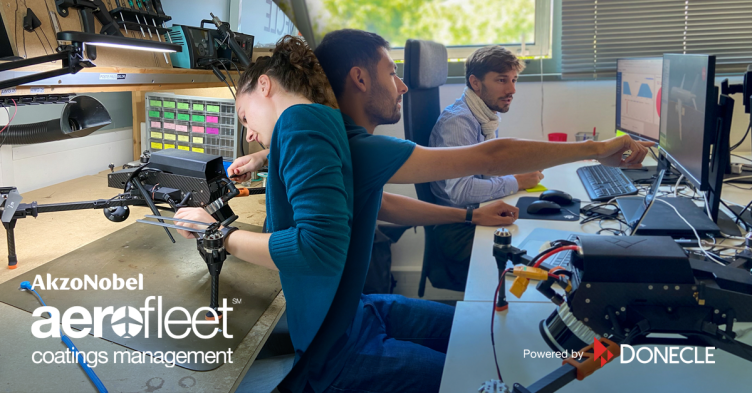Paints and coatings manufacturer AkzoNobel (Amsterdam, The Netherlands) has acquired a minority stake in Donecle (Toulouse, France), which specializes in automated drone inspections.
According to AkzoNobel, this drone technology is central to the manufacturer’s new Aerofleet coatings management service, which is aimed at helping airline operators optimize their aerospace coatings replacement and maintenance schedules for aircraft within their fleet.
Donecle’s technology was originally developed to automate and increase the efficiency of aircraft general visual inspections (GVIs), which include the detection and identification of lightning strikes.
Since then, it has evolved to be able to detect paint flaws, scratches, and other coatings’ issues, such as rivet rash. The findings are then analyzed to determine the overall health of the coating and whether—or when—a new coating may be required.
According to Patrick Bourguignon, managing director of AkzoNobel’s automotive and specialty coatings business, the investment reflects his company’s strategy of partnering with best-in-class technologies.
“It matches our commitment to developing new and ever more innovative services and solutions that help our aerospace customers to reduce costs, improve efficiency, and support a significantly more sustainable operation,” Bourguignon says.
Aerofleet Coatings Management
As a digital, data-driven predictive maintenance service, the Aerofleet system uses the data collected by drones to monitor and proactively manage each aircraft’s coating system.
Matthieu Claybrough, CEO of Donecle, expressed excitement at having backing from a prestigious global brand.
“We have already been collaborating to develop the new Aerofleet service and will be working closely with their teams in evolving this and other services to help keep our aerospace customers one step ahead of the competition,” Claybrough says.
As part of the Aerofleet solution, drones fly in a set grid over a plane’s surface while taking up to 1,000 high-definition photos. These are then analyzed by Donecle’s bespoke machine learning algorithm, which is based on a two-stage deep neural network to identify issues on the paint’s surface.
The drones are able to reach parts of an aircraft more quickly than a person can, while their patented laser positioning technology makes the flights fully automated, according to the companies. Navigation sensors enable each drone to fly and land safely.

Funding Details
After raising €1M in 2016, Donecle announced that its second funding round secured €5.6M. The majority was provided by AkzoNobel and one other investor, with both regarded as world-renowned players in the aerospace industry. The other investor was not disclosed.
“We are very pleased to announce the completion of this funding round, which testifies to the trust that our customers, partners, and investors all place in us,” Claybrough adds. “We’re also thrilled to be able to count on players who share our vision and are working with us to make it a reality. By investing in our future, AkzoNobel is helping us ramp up our inspection capabilities and scale them in their respective markets.”
Founded in 2015, Donecle specializes in automated inspections by drone. According to the company, its digital technology has revolutionized the inspection process, be it for civil and military aircraft or for components such as landing gear and engines.
Safe, Repeatable, Reliable
Donecle believes its drone-based inspections offer a safer, repeatable, and reliable alternative to conventional procedures for airlines, repair centers and other industry players.
“This increase in capital strengthens Donecle’s dominant position in the emerging market for aircraft inspections by drone,” the company says in a statement. “The funds raised will underpin an expansion of our marketing activities and an acceleration in production rates.”
“They will also be used to fast-track ongoing qualification programs with all the major aircraft manufacturers while extending their scope to include new capabilities under development, such as artificial intelligence for automatic detection and classification and the Iris dentCHECK for 3-D [three-dimensional] measurement of certain types of damage.”
“We are proud of this new milestone along Donecle’s journey and look forward to stepping up our current partnership with AkzoNobel, whose expertise and commitment to the aerospace industry will help us to achieve our shared vision of digitalizing aircraft inspections so as to increase the productivity of inspectors and decision-makers,” the statement concludes. “This ultimately saves time, materials, equipment, and money.”
Sources: Donecle, www.donecle.com; AkzoNobel, www.akzonobel.com.